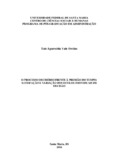| dc.creator | Freitas, Taís Aparecida Vale | |
| dc.date.accessioned | 2018-02-28T16:29:54Z | |
| dc.date.available | 2018-02-28T16:29:54Z | |
| dc.date.issued | 2016-11-21 | |
| dc.identifier.uri | http://repositorio.ufsm.br/handle/1/12570 | |
| dc.description.abstract | The instigating pursuit to understand the human behavior, more precisely about the mechanisms involved in the decision-making process of a person, are the basic premise for the accomplishment of this study. Decisions are present in all ambits of people’s life, and the identification and understanding of the factors that can influence them have great importance. Thus, this study aimed to verify how individuals modify the decision process under time’s pressure. The reach of this objective occurred through a laboratory quasi-experiment using three different instruments to collect data. The first stage of the experiment was the choice of a notebook by using the decision support system Decisor (LÖBLER, 2005), the second stage consisted in answer the Feeling Questionnaire in Relation to the Purchase (LUCIAN, 2008) and the third one, answering the Decision Style Inventory (ROWE, 1998). The sample consisted in 178 undergraduate students, divided into 2 groups: the control group and the group submitted to time pressure. The most popular chosen notebook was Sony. It was observed the existence of prior knowledge of the brand and the use of Image Theory to explain that choice. The individual decision-making styles most found in the subjects submitted to the task were the analytical and the conceptual. The hypotheses were tested using the Mann Whitney U test and the chi-square test, however, they were unable to prove statistically the hypotheses. We suggest more studies to prove the existence of low satisfaction with choices made under time pressure. | eng |
| dc.language | por | por |
| dc.publisher | Universidade Federal de Santa Maria | por |
| dc.rights | Attribution-NonCommercial-NoDerivatives 4.0 International | * |
| dc.rights.uri | http://creativecommons.org/licenses/by-nc-nd/4.0/ | * |
| dc.subject | Processo decisório | por |
| dc.subject | Decisão sob pressão do tempo | por |
| dc.subject | Estilos individuais de decisão | por |
| dc.subject | Decision-making | eng |
| dc.subject | Decision under pressure time | eng |
| dc.subject | Decision making styles | eng |
| dc.title | O processo decisório frente à pressão do tempo: satisfação e variação dos estilos individuais de decisão | por |
| dc.title.alternative | Decision-making under time pressure: satisfaction and the decision-making styles | eng |
| dc.type | Dissertação | por |
| dc.description.resumo | A instigante busca pela compreensão do comportamento humano, mais precisamente sobre os mecanismos envolvidos no processo decisório dos indivíduos, consistiu na premissa básica para a realização deste estudo. As decisões estão presentes em todos os âmbitos da vida dos indivíduos sendo de grande importância a identificação e compreensão dos fatores que podem influenciá-las. Assim, este estudo teve por objetivo verificar como os indivíduos modificam o processo decisório frente à pressão do tempo. O alcance desse objetivo ocorreu por meio de um quase experimento em laboratório utilizando três diferentes instrumentos de coleta de dados. A primeira etapa do quase experimento consistiu na escolha de um notebook utilizando o sistema de apoio à decisão Decisor (LÖBLER, 2005), a segunda etapa consistiu no preenchimento do Questionário de Sentimentos em Relação à Compra (LUCIAN, 2008) e a terceira no preenchimento do Decision Style Inventory (ROWE, 1998). A amostra foi composta por 178 alunos de graduação, divididos em 2 grupos: o grupo controle e o grupo submetido à pressão do tempo. O notebook mais escolhido pelos dois grupos foi o da marca Sony, observou-se a existência de conhecimento prévio da marca quanto à decisão de compra e também o uso da Teoria da Imagem para explicar a escolha. Os estilos individuais de decisão mais encontrados nos indivíduos submetidos à tarefa foram o analítico e o conceitual. As hipóteses foram testadas através do Teste U de Mann Whitney e do teste Qui-quadrado, contudo, as respostas obtidas nos testes não permitiram comprovar as três hipóteses estatisticamente. Sugere-se a realização de estudos mais aprofundados a fim de comprovar a existência de baixa satisfação com a escolha em decisões realizadas sob pressão do tempo. | por |
| dc.contributor.advisor1 | Löbler, Mauri Leodir | |
| dc.contributor.advisor1Lattes | http://lattes.cnpq.br/7320669188854401 | por |
| dc.contributor.referee1 | Visentini, Monize Sâmara | |
| dc.contributor.referee1Lattes | http://lattes.cnpq.br/6482101738421142 | por |
| dc.contributor.referee2 | Oliveira, Marta Olivia Rovedder de | |
| dc.contributor.referee2Lattes | http://lattes.cnpq.br/1370991937163803 | por |
| dc.creator.Lattes | http://lattes.cnpq.br/5817352341495623 | por |
| dc.publisher.country | Brasil | por |
| dc.publisher.department | Administração | por |
| dc.publisher.initials | UFSM | por |
| dc.publisher.program | Programa de Pós-Graduação em Administração | por |
| dc.subject.cnpq | CNPQ::CIENCIAS SOCIAIS APLICADAS::ADMINISTRACAO | por |
| dc.publisher.unidade | Centro de Ciências Sociais e Humanas | por |



